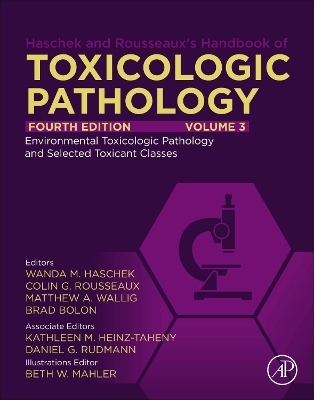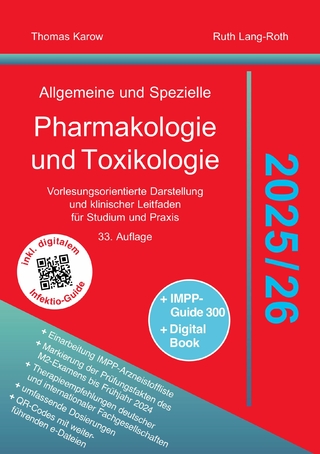
Haschek and Rousseaux's Handbook of Toxicologic Pathology, Volume 3: Environmental Toxicologic Pathology and Major Toxicant Classes
Academic Press Inc (Verlag)
978-0-443-16153-7 (ISBN)
This series comprises the most authoritative reference on toxicologic pathology for pathologists, toxicologists, research scientists, and regulators studying and making decisions on drugs, biologics, medical devices, and other chemicals, including agrochemicals and environmental contaminants. Each volume is being published separately.
Wanda M. Haschek-Hock, BVSc, Ph.D., is a Diplomate of the American College of Veterinary Pathologists (DACVP), Fellow of the International Academy of Toxicologic Pathology (FIATP), and Honorary Member of the Latin American Society of Toxicologic Pathology. She is Professor Emerita at the University of Illinois College of Veterinary Medicine, Department of Pathobiology. Wanda has over 40 years of experience in comparative, respiratory, and toxicologic pathology with a research focus on natural toxins and food safety. She is a former President of the Society of Toxicologic Pathology (STP) and of the Society of Toxicology’s (SOT) Comparative and Veterinary Specialty Section and has served as an Associate Editor for Toxicological Sciences and Toxicologic Pathology, as Councilor of the American College of Veterinary Pathologists (ACVP), and as Member of the American Board of Toxicology (ABT). She served as an Editor for the three editions of the Fundamentals of Toxicologic Pathology and Haschek and Rousseaux’s Handbook of Toxicologic Pathology. She is a recipient of the STP’s Lifetime Achievement Award, the SOT Midwest Regional Chapter’s Kenneth DuBois Award, and the University of Sydney Faculty of Veterinary Science Alumni Award for International Achievement in 2016. Colin G. Rousseaux, BVSc, Ph.D., DABT, FIATP, is also a Fellow of the Royal College of Pathology (FRCPath) and Fellow of the Academy of Toxicological Sciences (FATS). He is a Professor (Adjunct) in the Department of Pathology and Laboratory Medicine, Faculty of Medicine, University of Ottawa, Canada. He has over 35 years of experience in comparative and toxicologic pathology with a research focus on herbal remedies, fetal development and teratology, and environmental pollutants. He has described, investigated, and evaluated numerous toxicologic pathology issues associated with pharmaceuticals, pesticides, and agrochemicals. He has served on the editorial board of Toxicologic Pathology. He is a former President of the STP. Colin served as an Editor for the three editions of the Fundamentals of Toxicologic Pathology and Haschek and Rousseaux’s Handbook of Toxicologic Pathology. Matthew A. Wallig, DVM, Ph.D., DACVP, is Professor Emeritus in the Department of Pathobiology, College of Veterinary Medicine, the Department of Food Science and Human Nutrition, as well as the Division of Nutritional Sciences at the University of Illinois. His research has focused on the chemoprotective properties and mechanisms of phytochemicals in the diet, in particular those in cruciferous vegetables, soy, and tomatoes. His current interests have expanded to include defining morphologic parameters for diagnostic quantitative ultrasound in pancreatitis, pancreatic and hepatic neoplasia, metastatic disease, and chronic hepatic diseases such as nonalcoholic fatty liver disease (NAFLD) and nonalcoholic steatohepatitis (NASH). Matt has served as an Editor for the last two editions of the Fundamentals of Toxicologic Pathology and Haschek and Rousseaux’s Handbook of Toxicologic Pathology. Brad Bolon, DVM, MS, Ph.D., DAVCP, DABT, FATS, FIATP, FRCPath, has worked [sic] as an experimental and toxicologic pathologist in several settings: academia, a contract research organization, pharmaceutical companies (in both biomolecule and traditional small molecule settings), and private consulting. His main professional interests are the pathology of genetically engineered mice (especially embryos, fetuses, and placentas) and toxicologic neuropathology to assess the efficacy and safety of many therapeutic entities (biomolecules, cell and gene therapies, medical devices, and small molecules). He is a former President of the STP and a Member of the American College of Toxicology (ACT), British Society of Toxicological Pathology (BSTP), and European Society of Toxicologic Pathology (ESTP). Brad served as an Editor for the third edition of the Fundamentals of Toxicologic Pathology and an Associate Editor for the third edition of Haschek and Rousseaux’s Handbook of Toxicologic Pathology.
Part 1. Toxicologic Pathology in Environment and Food Protection
1. Environmental Toxicologic Pathology and Human Health
2. Food and Toxicologic Pathology
3. Nutrition and Toxicologic Pathology
Part 2. Selected Toxicant Classes
21. Herbal Remedies
22. Phycotoxins
23. Mycotoxins
24. Poisonous Plants
25. Animal Toxins
26. Bacterial Toxins
27. Metals
28. Agrochemicals
29. New Frontiers in Endocrine Disruptor Research
30. Nanoparticulate
31. Radiation and Other Physical Agents
| Erscheinungsdatum | 10.07.2023 |
|---|---|
| Verlagsort | San Diego |
| Sprache | englisch |
| Maße | 216 x 276 mm |
| Gewicht | 2740 g |
| Themenwelt | Studium ► 2. Studienabschnitt (Klinik) ► Pharmakologie / Toxikologie |
| ISBN-10 | 0-443-16153-4 / 0443161534 |
| ISBN-13 | 978-0-443-16153-7 / 9780443161537 |
| Zustand | Neuware |
| Informationen gemäß Produktsicherheitsverordnung (GPSR) | |
| Haben Sie eine Frage zum Produkt? |
aus dem Bereich


